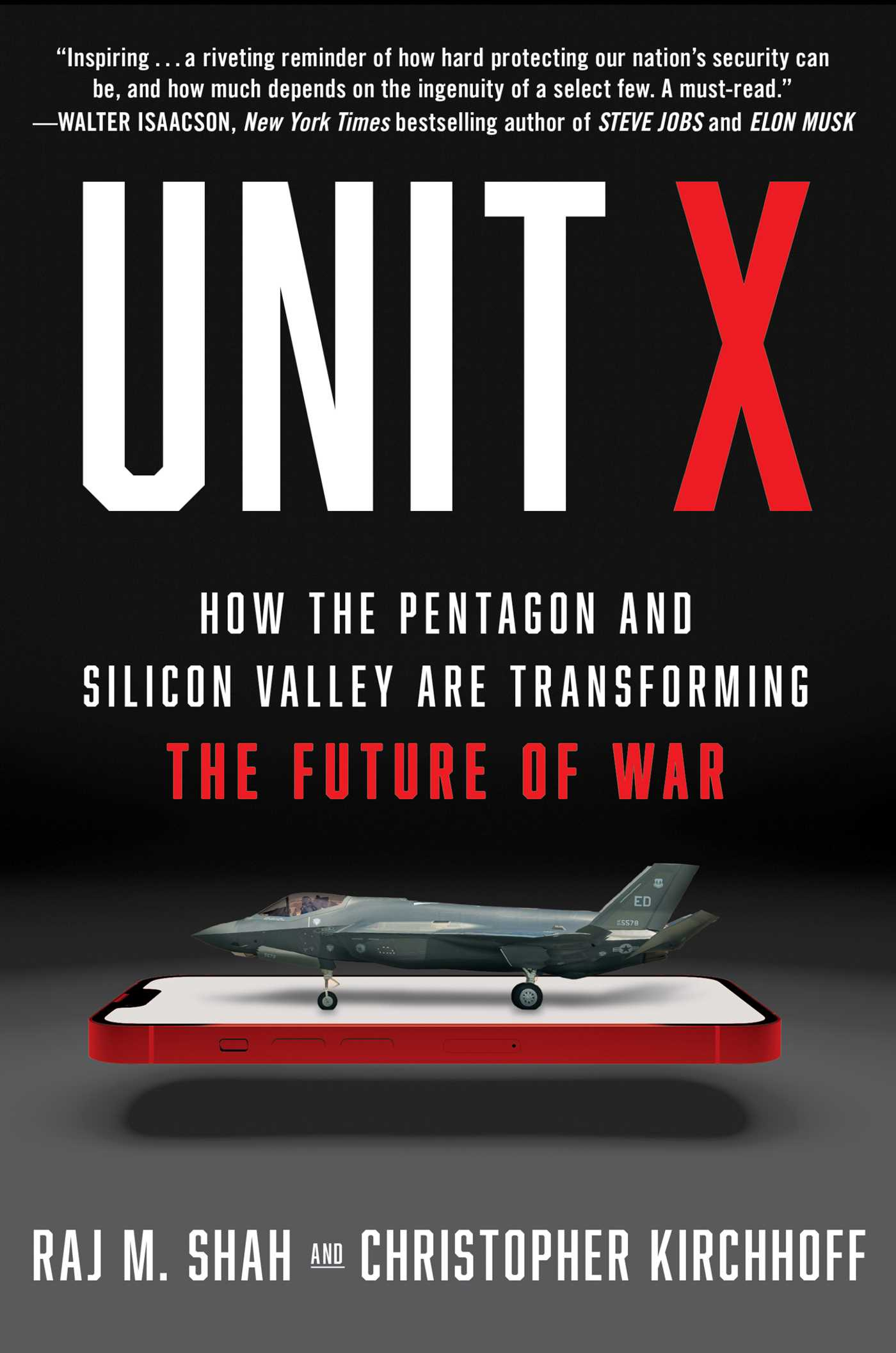No one ever bothers to provide a citation, so perhaps the story is untrue.
But here’s how it goes: At the dawn of World War I, the American Chemical Society offered its services to the War Department. The response? “Thank you, we already have a chemist on our staff.”
Raj M. Shah and Christopher Kirchhoff can relate. They played instrumental roles in the founding era of what is now the Defense Innovation Unit (DIU), “the only DoD organization focused exclusively on fielding and scaling commercial technology across the U.S. military at commercial speeds.” For 132 pages, Unit X: How the Pentagon and Silicon Valley Are Transforming the Future of War (Scribner; 336 pages; $30.00) details their attempt to address a long-overlooked failure:
Legacy tech riddled the military’s ranks. It was as if the military had resigned itself to becoming a display in the Museum of Computer History. You could visit an army, air force, or naval base to see what people used in the past, then go to Best Buy to see how far technology had evolved.
Shah (a “serial technology entrepreneur” and former F-16 pilot) and Kirchhoff (a National Security Council flunkie for the Obama administration with a Ph.D. from Cambridge) devoted much of their time at the DIU to relationship repair. The Pentagon and Silicon Valley had “stopped talking to each other” in the 1990s. Behemoths like Apple and Google were growing into planetary powerhouses, but the military
was content to keep dealing with a handful of giant defense contractors, like Lockheed Martin, Northrop Grumman, and Raytheon — known in Washington as the “primes.” The arrangement suited members of Congress who controlled the budget, because they were keen to protect the job-creating mega-contracts that had brought prosperity to their districts. The Pentagon even relied on the primes to develop the military’s IT and software, a folly akin to hiring Microsoft to build an aircraft carrier.
Shah and Kirchhoff tried to inject speed and flexibility into a system built on process and inertia. (And legal bribery.) The results? Some successes, including arrangements with Pivotal Software, Saildrone, and Joby Aviation. But a helluva lot of resistance, too.
Bizarrely, right when readers begin to anticipate our heroes’ epic showdown with Pentagon apparatchiks, Unit X’s authors veer off, and lurch into a disjointed, self-indulgent mess. Since Kirchhoff left the DIU in November 2017, and Shah followed several months later, the remainder of their book has very little to do with “an elite unit … whose mission is to bring Silicon Valley’s cutting-edge technology to America’s military.”
First up is Kirchhoff’s 43-page hagiography of the National Security Commission on Artificial Intelligence. Essential, he believes, because China crafted separate plans for “AI, next-generation networks, semiconductors, advanced manufacturing, synthetic biology, biopharmaceuticals, quantum computing, [and] fusion energy.” The august panel, chaired by Google’s ex-CEO Eric Schmidt, helped win passage of the CHIPS and Science Act, a corporate-welfare monstrosity that, as POLITICO reported, attracted “a startling array of companies … angling for a payday, some with an unclear connection to microchips.” Kirchhoff considers it “some of the most significant national security legislation in decades.” (The posterior-smooching he delivers to Congress is nauseating: “Pelosi, age eighty, wore a cashmere blazer, a purple dress, and heels. While taking small bites of cheesecake … she thanked everyone for staying an apologized for arriving later than planned.”)
Shah is next, with a 20-page diversion that includes a list of “policy changes that could improve U.S. military readiness.” He supports a “short stint of mandatory national service,” to “achieve the broad goals of bringing our nation together.” He wants the federal government to offer “visas to the top twenty AI scientists, and their families, to settle in America.” And “closed bases in affluent areas” such as San Francisco and Boston should be reopened, to bridge “the civil-military divide,” and make it common, again, to encounter “people in uniform walking around.” (Shah has no shame in pushing his VC fund: “Today, Shield Capital helps innovative companies survive … existential crises — as a way to make money, yes, also to preserve democracy.”)
At the very end of Unit X — after the obligatory section on “pariah” Vladimir Putin’s invasion of Ukraine — Shah and Kirchhoff preen that the “greatest kind of patriots ... are those who so cherish our country’s ideals that they’re not afraid to challenge the institutions that guard them.” Sorry, fellas, but you’re not courageous iconoclasts, but cloying suck-ups, making quite comfortable livings by supercharging a wildly unsustainable “defense” architecture with gee-whiz tech. Wherever Dwight D. Eisenhower is, he’s not impressed.





I believe that interest payments on the national debt exceed the defense budget this year. Something's gotta give.